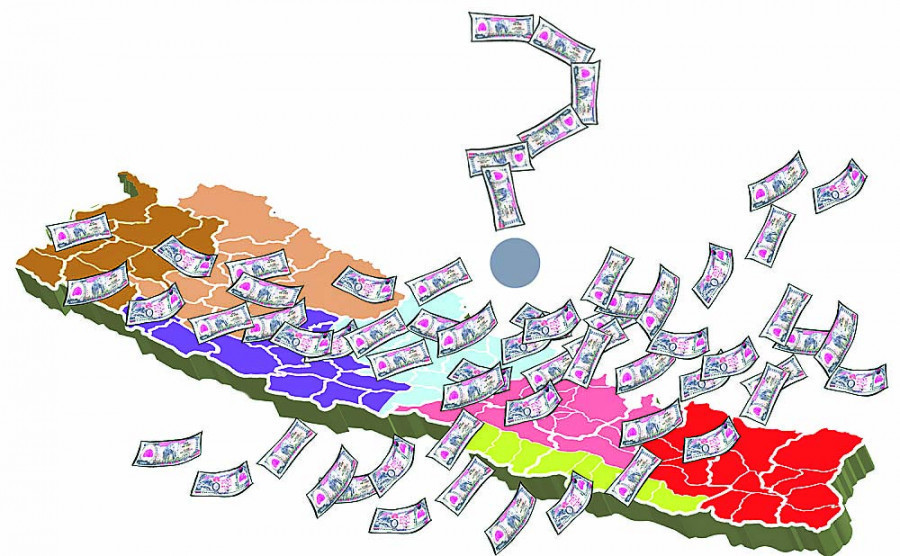National
Nepal faces setbacks in implementing administrative and fiscal federalism
Provincial, local governments are reeling from staff shortages, high turnover of officials.
Post Report
Nepal’s constitution envisions three pillars—political, administrative and fiscal—for federalism. While the country has successfully enacted political federalism with periodic elections and proportional representation in the elected state machinery, it lags in administrative and fiscal federalism.
Around eight years have passed since the provincial and local governments came into being through 2017 general elections, but they still lack enough civil servants to function effectively. Around a third of the local units are without chief administrative officers (CAO). Their turnover is high even where they are posted as they rather want to work under the federal government.
“We had to come to Kathmandu twice to get the chief administrative officer in our place. Salaries pending for months were released a couple of weeks ago,” said Devika Thami, vice-chairperson of Bigu Rural Municipality in Dolakha, at an interaction organised jointly by Provincial Centre for Good Governance under Bagmati Province and Federalism and Localisation Centre. The CAO’s clearance is a must to release salaries and other budgets at the local level.
The case at the provincial level is no different. While close to 35 percent of the positions lie vacant, the bureaucracy, often termed the permanent government, is unstable, according to studies carried out by the centre in different provinces. For instance, three principal secretaries have changed in the Bagmati Province in the past eight months.
“There have been no tangible results in fiscal federalism as well,” says Dil Kumari Rawal, former member of the National Assembly who was involved in the study.
Local units complain that the federal government is cutting the equalisation grant, but increasing the share of conditional grants. Similarly, both the local and provincial governments are unhappy with the revenue distribution which, they say, is not equitable.
“Our constitution envisions cooperation, coordination and co-existence between the three tiers of governments, but this doesn’t seem to have translated into practice,” said Rawal.
Those involved in the study say all the provinces complain about not being able to work effectively due to lack of resources and a police force. Prahlad Lamichhane, a member of the former constituent assembly who was involved in the study, said the provinces complained that they have been treated like “unwanted children.”
“Compared to other provinces, we found Madhesh, Karnali and Sudurpaschim provinces more committed to federalism,” said Lamichhane. As claimed by Lamichhane, Madhesh province has filed half a dozen writ petitions in the Supreme Court against the federal government arguing it encroached upon the province’s constitutional authority. The constitutional bench of the top court has yet to issue final verdicts on the petitions.
Experts on federalism say there are several mechanisms for
coordination between the three tiers of government. But either their meetings are not held regularly or their decisions go unimplemented.
For instance, a meeting of the National Coordination Council in 2023 had made six decisions. But most of those decisions made after two days of discussions between the representatives of the three tiers remain unaddressed.
Removing ambiguity and duplication in the implementation of laws among the three tiers; cooperating while making laws related to concurrent powers; and formulating and implementing laws essential for federalism’s successful implementation were the key decisions made by the meeting.
Likewise, improving human resource management and service delivery; guaranteeing a minimum two-year posting for chief executive officers of local governments and a one-year posting for provincial employees; and streamlining the process of land acquisition required for subnational infrastructure construction, were its other decisions. However, the old problems persist.
“There must be regular dialogue among all tiers of governments to resolve the problems,” said Khimlal Devkota, a former member of the upper house.
Federal ministers also agree that there has not been expected progress towards full-fledged implementation of federalism. “I would expect you [provincial and local representatives] to raise the matter before the chairperson or president of your respective parties, not just in public forums,” said Minister of Communication and Information Technology Prithvi Subba Gurung.




 10.12°C Kathmandu
10.12°C Kathmandu














